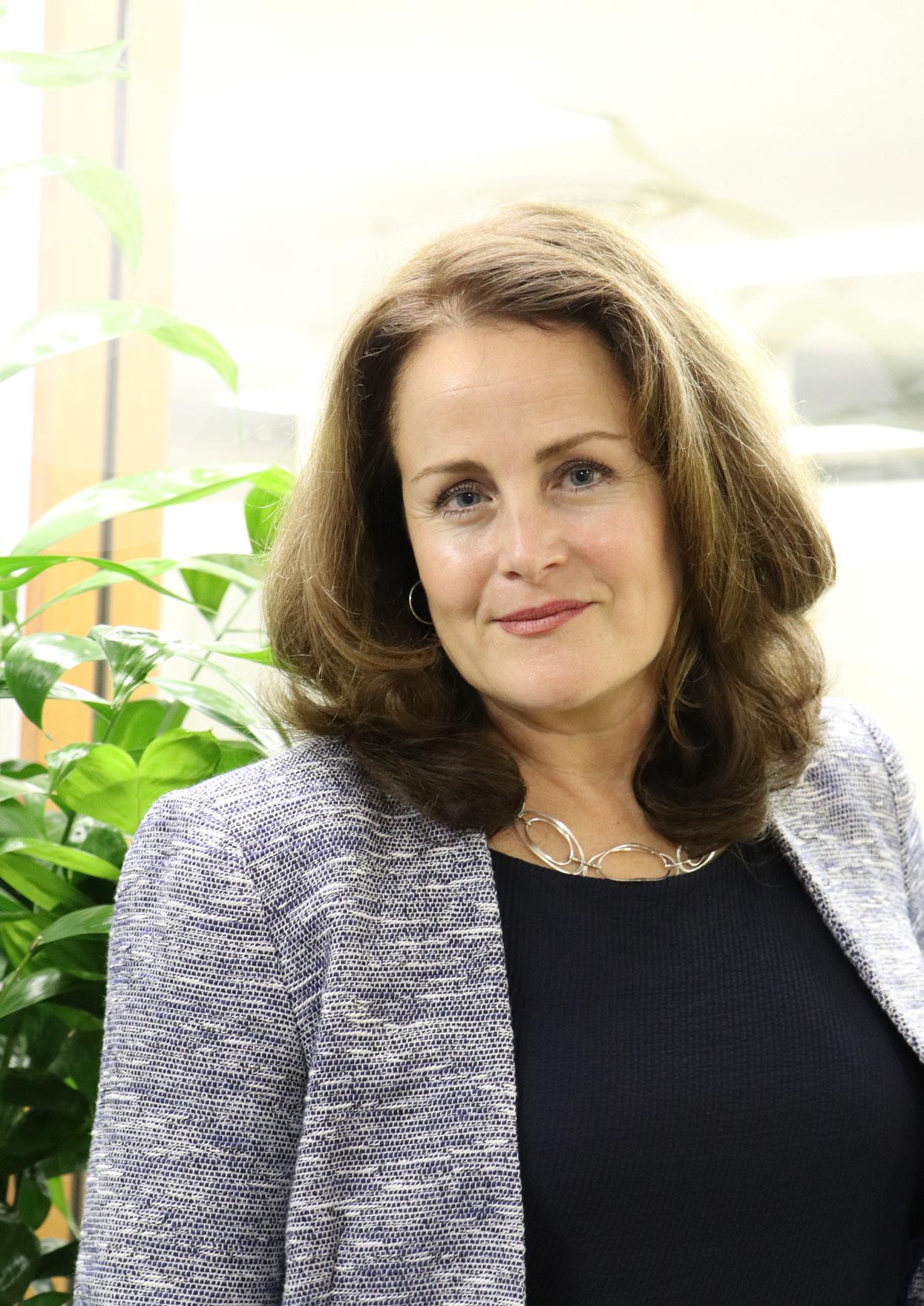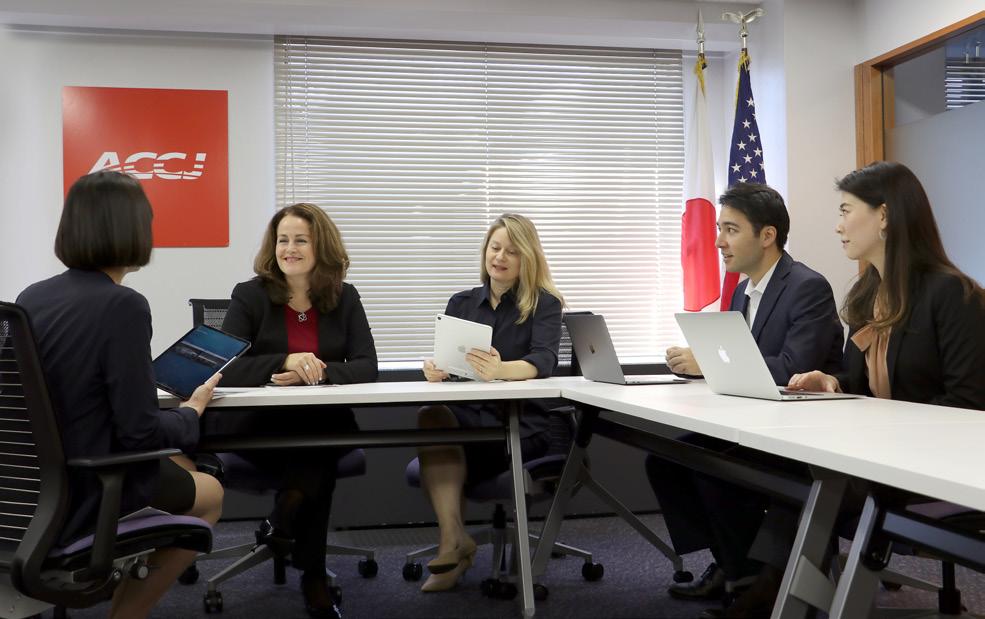
10 minute read
INTERVIEW
2020 Perspective
Executive Director Laura Younger on the ACCJ in a new decade
Advertisement
By C Bryan Jones
As we enter a new decade—one that begins with the global spotlight on Japan, from sporting events and tourism to bilateral economic relations—the American Chamber of Commerce in Japan (ACCJ) is preparing for one of the most exciting and important years in its seven-decade history. The past five years have been a period of rapid change for the chamber that coincides with the leadership of Laura Younger, who took on the role of executive director in 2014 following more than 15 years with the chamber. To kick off the second decade of the 21st century, The ACCJ Journal sat down with Younger to look back at key changes, how the chamber’s advocacy voice has grown, and why she thinks the road ahead is bright.
GROWING DIVERSITY Over the past decade, the demographics of the ACCJ have changed greatly. The percentage of members who are female has more than doubled and Japanese businesses have become more interested in the chamber. “Ten years ago, women made up maybe 10 percent or less of our membership. So that change is very significant,” Younger said. “And I think the number of Japanese companies who have joined the ACCJ is also really impressive. It would have been unheard of at that time for a large Japanese manufacturing company to join the American Chamber of Commerce.”
These shifts have added to the chamber’s diversity and have helped the membership reach its greatest numbers ever. A more diverse membership, however, brings a wider range of needs in terms of information-sharing and networking activities—and that can be seen in the lineup of events.
“Our activities have become more narrowly focused. Our events and meetings are smaller now but draw a more focused audience. More than 10 years ago, we had much larger events with broader subjects, speakers, and audiences.”
But smaller doesn’t mean fewer. Younger said that the numbers remain about the same. The change in focus has been influenced by many factors.
“A decade ago, we didn’t have access to as much information as we have today. We didn’t have the networking variety that’s available now, including online tools and other organizations with networking groups. The ACCJ represented exclusive access to that information and those networks. So, as options have grown, we’ve really had to be cognizant of the changes and how we can provide what members most value, because we are essentially competing now with a much wider spectrum of players.”
LONG-AWAITED MOMENT On the advocacy side, Younger said that the most exciting advocacy the ACCJ has been working on in the past decade is happening right now, with the US–Japan Trade Agreement. “We’ve wanted for a long time to address issues that impact member industries, and seeing this in progress with the first stage of the trade agreement is very important for the ACCJ and for the US–Japan relationship,” she said.
“The ACCJ has always had a strong voice, and, over seven decades, has really gained the respect of both the US and Japanese governments. Our relationship with the US government has really been strengthening—we have trust— and I think, with that, we’ve been able to have a voice and have influence in the trade dialogue.”
Younger attributes this to the ACCJ’s business-focused membership that has championed a strategic approach to government engagement. “With our DC Doorknock trips to Washington, we’ve really elevated what we do on that mission. Now, we’re taking CEOs of US companies, those actually running operations in Japan for household US brands. That has a huge impact in Washington and really opens the door for us to engage in dialogue with policymakers. We’ve seen that with the digital agreement that’s part of this first phase of the trade agreement.”
She also credits former US ambassadors to Japan Caroline Kennedy and William F. Hagerty IV, along with the teams at the Embassy of the United States, Tokyo, and the US Consulates General Osaka-Kobe and Nagoya. “How they work with the Japanese government has helped to further the relationship we have on the ground here. When that relationship is positive, it helps us to work closely with our Japanese government counterparts.

Fire Up the Grill
Winter chill got you dreaming of spring? Start planning your next warm weather cookout today.
With sizzling steaks, chargrilled burgers and skyline views from the outdoor barbecue terrace, Tokyo American Club is the perfect spot for a one-of-a-kind party with friends or an entertaining evening with coworkers.



“We value our relationship with the embassy. They have been very supportive in helping us have a much stronger voice in Washington, and are a very important partner for the ACCJ.” That partnership in Tokyo, together with an increased presence in Washington, has strengthened the ACCJ’s voice with the US government and increased its credibility with the Japanese government, she believes. And that, she said, creates a stronger voice for US business on the ground in Japan.
LEADING BY EXAMPLE “Over the past decade, the ACCJ has been focused strongly on workforce engagement and diversity. I think that, in part, links back to the fact that there were few women here when I first came to the chamber 20 years ago. I went to an event and there were none there. It was significant because it meant half of the community was being left out of important discussions,” Younger recalled. “But, today, the chamber is at the cutting edge, driving the community as the hub of the initiative to help women and diversity in the workforce. I think we’ve had a huge impact.” She sees this as being largely responsible for growing the percentage of women in both the membership and leadership. “If you look at the Board of Governors, it’s almost half women. That’s very impressive. And I am the first woman to have this role. So, I think that the chamber has been not only advocating but also practicing what it is preaching.”

Leading by example extends beyond the public face of the chamber to how it operates, and Younger has worked to shape the ACCJ office environment into one that reflects the chamber’s advocacy positions on workstyle reform— especially in the areas of women in business and supporting the needs of her employees.
“Making the office a more family-friendly place is something that many companies really struggle with. How do you handle maternity and paternity leaves—or any kind of leave for that matter. That’s a challenge, and from the moment I took this role as executive director, I wanted to make changes that would allow us to be an example,” she said. “We have 23 full-time staff, and we have eight babies. That’s a lot in five years! And that means that we must have policies that support family needs so that they can balance work with raising children.”
Apart from leave and remote work options, this includes things such as a dedicated nursing room right in the office. “We’ve taken the best practices that we’ve been advocating and promoting to the Japanese government and global companies and brought those inside, to the ACCJ office.”
MEMBER DRIVEN An organization such as the chamber is nothing without its members, and the ACCJ is one of the largest of its kind in the region. But simple numbers do not tell the full story.
We have the most robust and sophisticated advocacy program . . . and the level of expertise among our membership is unlike anything that exists in Asia.
Growing at ASIJ

In a metropolis like Tokyo, space is a valuable asset. At ASIJ we have the space to play, run, jump, score goals, wrestle and swim. We have the space to grow sweet potatoes, take nature walks, launch rockets, build robots and make our ideas come to life. We have the space to sing and dance, perform comedies and tragedies and make movies and build sets. We have the space to collaborate, share our work with classmates and colleagues, host conferences and welcome speakers. We have space to grow and learn.
The American School in Japan Early Learning Center (N–K) 6-16-5 Roppongi, Minato-ku, Tokyo 106-0032 03-5771-4344 elc@asij.ac.jp Chofu Campus 1-1-1 Nomizu, Chofu-shi, Tokyo 182-0031 0422-34-5300 enroll@asij.ac.jp
Fostering a community of inquisitive learners and independent thinkers, inspired to be their best selves, empowered to make a difference.
“We’ve always had a strong membership. But I would say that, in my time, the membership has gotten even stronger with so many impressive leaders who fully commit, engage, and spend their time leading ACCJ initiatives,” Younger said. “And, with that, what I think is really interesting is that you start to see—as you bring in these strong leaders, who are all at the top of their game—how they naturally contribute the very best they have to offer. They are constantly raising the bar higher and higher. And what ends up happening is that you just have this incredibly engaged group of significant business leaders who are doing so much. Thanks to their contributions, the chamber grows faster and stronger.”
This is a big difference she sees between the ACCJ and some of the other large American chambers of commerce in Asia. “Many of them struggle with engagement and getting people interested in leadership roles,” she said. “We have been very fortunate and privileged to have so many members interested in taking on a volunteer position.”
FULL SPECTRUM The ACCJ represents US business in Japan and, for many of its member companies, the Japanese market is the second largest outside the United States. “With that, there is real diversity in industry and types of companies, so we need to be representing all of US business,” Younger said. “I think we do a very good job of that. Among our membership, we have everything that America is so famous for—innovation, starting new things, strong values, and a focus on community.”
This very diverse mix of companies means that the ACCJ has developed an infrastructure that has become a model for other American chambers of commerce in the region.
“Most AmChams have about 20 committees. We have more than 70. That’s kind of incredible. We cover every industry and professional service, and that reflects the diversity of needs— as well as how wide and broad the membership is—from the smallest companies all the way up to the most famous brands,” she continued. “When a member has an issue, if that issue is aligned with the ACCJ’s Core Advocacy Principles and is something impacting the wider industry, we will take it on and work to address it.”
A number of committees have formed for this reason— when an ongoing matter or opportunity has arisen—and each has at least two leaders. “If you look at the number of leaders, our members who are volunteering their time to lead these committees, it’s incredible. We have the most robust and sophisticated advocacy program—one that is extremely well run and very member driven—and the level of expertise among our membership is unlike anything that exists in Asia,” Younger said.
LOOKING AHEAD With so much of the world’s focus on Japan, 2020 looks to be big for the ACCJ. The chamber continues to take steps to modernize to ensure that it is built for the decade to come. Younger thinks the organization is ready.
“This year is going to be one of the most exciting and important years in the chamber’s history. We’ve got the trade agreement and will be continuing to push toward the second stage,” Younger said. “Then there are the Olympics and Paralympics being hosted in Japan. Certainly, there is very strong US support in terms of sponsors and the athletic program.
“More broadly, the lead-up to the Olympics and the increase in tourism has had a huge impact on all businesses. With that has really come increased knowledge of Japan in the United States as a place to do business. As a result, I think we’re going to see many new entrants in the market.
“So, this year is going to be the year for the United States and Japan. I think we have a lot of opportunity. And if we’re going to have a big impact on the next decade, I think it starts right away, in 2020.” n






